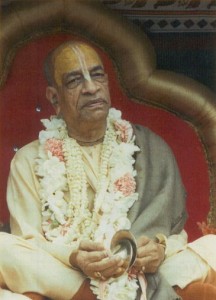SB 4.24.67–My dear Lord, any learned person knows that unless he worships You, his entire life is spoiled. Knowing this, how could he give up worshiping Your lotus feet? Even our father and spiritual master, Lord Brahmā, unhesitatingly worshiped You, and the fourteen Manus followed in his footsteps.
PURPORT-The word paṇḍita means “a wise man.” Who is actually a wise man? The wise man is described in Bhagavad-gītā (7.19) in this way: bahūnāṁ janmanām ante jñānavān māṁ prapadyate vāsudevaḥ sarvam iti sa mahātmā sudurlabhaḥ
“After many births and deaths, he who is actually in knowledge surrenders unto Me, knowing Me to be the cause of all causes and all that is. Such a great soul is very rare.”
Thus when the wise man actually becomes wise after many births and whimsical attempts at self-realization, he surrenders unto the Supreme Personality of Godhead, Kṛṣṇa. Such a mahātmā, or learned person, knows that Kṛṣṇa, Vāsudeva, is everything (vāsudevaḥ sarvam iti [Bg. 7.19]). Learned persons always think that life is wasted unless they worship Lord Kṛṣṇa or become His devotee. Śrīla Rūpa Gosvāmī also says that when one becomes an advanced devotee, he understands that he should be reserved and perseverant (kṣāntiḥ) and that he should engage in the service of the Lord and not waste time (avyartha-kālatvam [Cc.Madhya 23.18-19]). He should also be detached from all material attraction (viraktiḥ), and he should not long for any material respect in return for his activities (māna-śūnyatā). He should be certain that Kṛṣṇa will bestow His mercy upon him (āśā-bandhaḥ), and he should always be very eager to serve the Lord faithfully (samutkaṇṭhā). The wise man is always very eager to glorify the Lord by chanting and hearing (nāma-gāne sadā ruciḥ), and he is always eager to describe the transcendental qualities of the Lord (āsaktis tad-guṇākhyāne). He should also be attracted to those places where the Lord had His pastimes (prītis tad-vasati-sthalePrītis tad vasati sthāle). These are symptoms of an advanced devotee.
An advanced devotee, or a perfect human being who is actually wise and learned, cannot give up his service at the lotus feet of the Lord.
When one is engaged in devotional service, he is often surrounded by envious people, and often many enemies come to try to defeat him or stop him. This is not new in this present age, for even in the days of yore Prahlāda Mahārāja, who was engaged in the devotional service of the Lord, was harassed by his demoniac father, Hiraṇyakaśipu. The atheists are always prepared to harass a devotee; therefore Caitanya Mahāprabhu suggested that one be very tolerant of these people. Nonetheless, one has to continue chanting the Hare Kṛṣṇa mantra and preaching the chanting of this mantra because such preaching and chanting constitute the perfection of life. One should chant and preach about the urgency of making this life perfect in all respects. One should thus engage in the devotional service of the Lord and follow in the footsteps of previous ācāryas, beginning with Lord Brahmā and others.
In regard to the above purport- reference….
Madhya 23.18-19...” ‘When the seed of ecstatic emotion for Kṛṣṇa fructifies, the following nine symptoms manifest in one’s behavior: forgiveness, concern that time should not be wasted, detachment, absence of false prestige, hope, eagerness, a taste for chanting the holy name of the Lord, attachment to descriptions of the transcendental qualities of the Lord, and affection for those places where the Lord resides-that is, a temple or a holy place like Vṛndāvana. These are all called anubhāva, subordinate signs of ecstatic emotion. They are visible in a person in whose heart the seed of love of God has begun to fructify.’
PURPORT-These two verses are found in the Bhakti-rasāmṛta-sindhu (1.3.25-26).
SB 4.24.68 purport…If one strictly follows the process of devotional service, he has no fear of death, for he is predestined to go back home, back to Godhead. The nondevotees are fearful of death because they have no guarantee of where they are going or of the type of body they are going to get in their next life. The word rudra-bhaya is significant in this verse because Rudra himself, Lord Śiva, is speaking of “fear of Rudra.” This indicates that there are many Rudras—eleven Rudras—and the Rudra (Lord Śiva) who was offering this prayer to the Supreme Personality of Godhead is different from the other Rudras, although he is as powerful as they are. The conclusion is that one Rudra is afraid of another Rudra because each and every one of them is engaged in the destruction of this cosmic manifestation. But for the devotee, everyone is afraid of Rudra, even Rudra himself. A devotee is never afraid of Rudra because he is always secure, being protected by the lotus feet of the Lord. As Śrī Kṛṣṇa says in Bhagavad-gītā (9.31), kaunteya pratijānīhi na me bhaktaḥ praṇaśyati: “My dear Arjuna, you may declare publicly that My pure devotee will not be vanquished under any circumstances.”
Some Conclusions-Srila Prabhupada tells us that after many whimsical attempts at self realization, we finally get serious and then become a surrendered soul to Bhagavan Sri Krsna. Also mentioned are the actual signs of an advanced soul
Hare Krsna
damaghosa das


